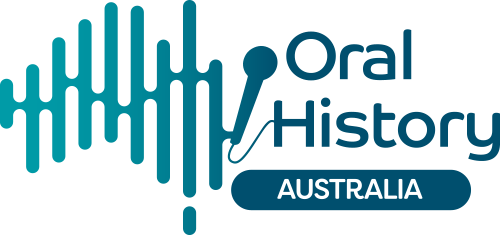About this OHA guide
Developed by senior members of Oral History Australia, this guide aims to explain the unique nature of oral history research techniques.
It is designed for use by postgraduate students preparing ethics applications as part of their research. Students are welcome to attach the guide as part of their ethics applications.
Updated: November 2021.
Guidance for applicants and assessors
Oral history – University ethical approval of a project involving humans
This guidance sheet has been drawn up by experienced oral historians in Oral History Australia, the peak body for Australian oral history researchers since 1979. Applicants seeking ethics approval for an oral history project may include this guidance sheet with their application, and may refer to relevant sections in their application. Assessors of oral history projects seeking ethical approval are encouraged to consider the following guidance.
Oral history involves the ‘interviewing of eye-witness participants in the events of the past for the purposes of historical reconstruction’.[i] Oral historians work in a range of academic disciplines, including but not only history, and in the wider world of community and public history. Oral historians share Ethics Committees’ concerns about ethical human research. Indeed, national oral history associations around the world, including in Australia, have for many years supported clearly defined ethical guidelines for oral history research. For examples of these guidelines see the web-links listed below. The following list notes several aspects of standard international practice in oral history that are relevant to ethics approval.
- Archival aims. A primary aim of oral history is to add previously unrecorded voices to the historical record, and oral history ethical guidelines stress the researcher’s responsibility to ensure the secure and permanent preservation of the interview, subject to the interviewee’s wishes. Oral history interviews are therefore usually recorded with a permanent archive status in mind. Preliminary information and discussions with interviewees will be clear on this point, and ‘permission for use’ (consent) forms enable the interviewee to make an informed choice about archive preservation – and about what they want to say ‘on the record’. It is possible, therefore, that an oral history project seeking ethical approval will specify an intention to produce a permanent archive record (with informed consent), and will not propose to destroy the interviews after they have been securely stored at the university for a specified period.
- Anonymity. Unlike in some social science research, oral history interviewees typically wish to be named and ‘on the record’. The value of oral history interviews often increases markedly if the reader/listener knows who is speaking. Oral historians use ‘permission for use’ forms to record their interviewee’s wishes in regard to naming or anonymity. Interviewees always have the option of anonymity.
- Copyright. Oral historians are very aware that in law an interviewee retains copyright over their contribution to a recording until they assign copyright using a permission for use form. University ethical approval forms do not always mention copyright, though consent form templates often assume that copyright is assigned to the research project. Oral history projects may use a ‘permission for use’ form for the assignment of copyright by the interviewee (in most cases) to the researcher / research project. Where appropriate, and with the informed consent of the interviewee, the researcher may subsequently reassign copyright to an archive. In some cases an interviewee may agree to share copyright in the interview with the researcher. In some contexts, especially in First Nation communities, it may be more appropriate for the interviewee to retain copyright and issue the interviewer a copyright licence for their particular project (eg Creative Commons Attribution-Non Commercial 4.0 International Licence or an Exclusive Use Copyright Agreement). This ensures that the project has an enduring benefit to the interviewee and their community, rather than just being of benefit to the researcher. Whatever is decided, researchers may wish to draw up an agreement with their university making it clear that copyright vests in the interviewer and / or interviewee, rather than the university.
- Sensitive topics. Most oral history falls into the ‘low risk’ category for ethical approval (‘the foreseeable risk is no more than discomfort’). However, in any life history interview there is always a chance that sensitive issues will arise. Oral historians are trained to deal with such situations with sensitivity and respect and to defer to the interviewee’s wishes. In the vast majority of interviews, interviewees appreciate the opportunity to talk about such aspects of their lives and this is a positive experience.
- Home settings. Oral history guidelines recommend that interviews take place in the most comfortable and appropriate place for the interviewee – which is usually the interviewee’s own home. We support this recommendation. Though applicants should assess if there are any risks specific to their proposed interviews, for most interviews where there is no foreseeable health and safety risk, applicants should specify and abide by standard oral history precautions as follows: leave full interview details (time and place of interview, name of interviewee, mobile phone number) with a third party; report in to that third party on completion of the interview.
Web links to oral history association ethical guidelines:
- Oral History Australia: www.oralhistoryaustralia.org.au/guide-ethical-practice
- Oral History Association (USA): www.oralhistory.org/oha-statement-on-ethics/
- Oral History Society (UK): www.ohs.org.uk/legal-and-ethical-advice/
- National Oral History Association of New Zealand: www.oralhistory.org.nz/index.php/ethics-and-practice/
This guidance sheet was approved by the Oral History Australia Committee, 21 September 2019
[i] R. K. Grele, quoted in Robert Perks and Alistair Thomson (eds), The Oral History Reader, 2nd edition, Routledge, 2006, p ix.
